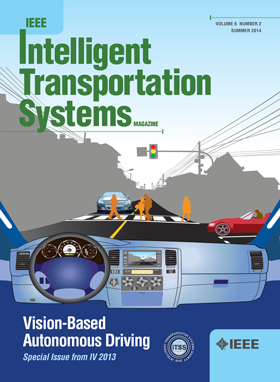Enhancing Perception for Autonomous Vehicles: A Multi-Scale Feature Modulation Network for Image Restoration
IF 8.4
1区 工程技术
Q1 ENGINEERING, CIVIL
IEEE Transactions on Intelligent Transportation Systems
Pub Date : 2025-02-17
DOI:10.1109/TITS.2025.3538485
引用次数: 0
Abstract
Accurate environmental perception is essential for the effective operation of autonomous vehicles. However, visual images captured in dynamic environments or adverse weather conditions often suffer from various degradations. Image restoration focuses on reconstructing clear and sharp images by eliminating undesired degradations from corrupted inputs. These degradations typically vary in size and severity, making it crucial to employ robust multi-scale representation learning techniques. In this paper, we propose Multi-Scale Feature Modulation (MSFM), a novel deep convolutional architecture for image restoration. MSFM modulates multi-scale features in both frequency and spatial domains to make features sharper and closer to that of clean images. Specifically, our multi-scale frequency attention module transforms features into multiple scales and then modulates each scale in the implicit frequency domain using pooling and attention. Moreover, we develop a multi-scale spatial modulation module to refine pixels with the guidance of local features. The proposed frequency and spatial modules enable MSFM to better handle degradations of different sizes. Experimental results demonstrate that MSFM achieves state-of-the-art performance on 12 datasets for a range of image restoration tasks, i.e., image dehazing, image defocus/motion deblurring, and image desnowing. Furthermore, the restored images significantly improve the environmental perception of autonomous vehicles.增强自动驾驶汽车感知:一种多尺度特征调制网络用于图像恢复
准确的环境感知对于自动驾驶汽车的有效运行至关重要。然而,在动态环境或恶劣天气条件下拍摄的视觉图像往往会出现各种退化。图像恢复的重点是重建清晰和清晰的图像,消除从损坏的输入不希望的退化。这些退化通常在大小和严重程度上有所不同,因此采用稳健的多尺度表示学习技术至关重要。在本文中,我们提出了一种新的用于图像恢复的深度卷积结构——多尺度特征调制(MSFM)。MSFM在频率域和空间域调制多尺度特征,使特征更清晰,更接近干净图像。具体来说,我们的多尺度频率注意模块将特征转换成多个尺度,然后使用池化和注意在隐频域中调制每个尺度。此外,我们开发了一个多尺度空间调制模块,以局部特征为指导来细化像素。所提出的频率和空间模块使MSFM能够更好地处理不同大小的退化。实验结果表明,MSFM在12个数据集上实现了最先进的图像恢复任务,即图像去雾、图像散焦/运动去模糊和图像去雪。此外,恢复后的图像显著提高了自动驾驶汽车的环境感知能力。
本文章由计算机程序翻译,如有差异,请以英文原文为准。
求助全文
约1分钟内获得全文
求助全文
来源期刊

IEEE Transactions on Intelligent Transportation Systems
工程技术-工程:电子与电气
CiteScore
14.80
自引率
12.90%
发文量
1872
审稿时长
7.5 months
期刊介绍:
The theoretical, experimental and operational aspects of electrical and electronics engineering and information technologies as applied to Intelligent Transportation Systems (ITS). Intelligent Transportation Systems are defined as those systems utilizing synergistic technologies and systems engineering concepts to develop and improve transportation systems of all kinds. The scope of this interdisciplinary activity includes the promotion, consolidation and coordination of ITS technical activities among IEEE entities, and providing a focus for cooperative activities, both internally and externally.
 求助内容:
求助内容: 应助结果提醒方式:
应助结果提醒方式:


